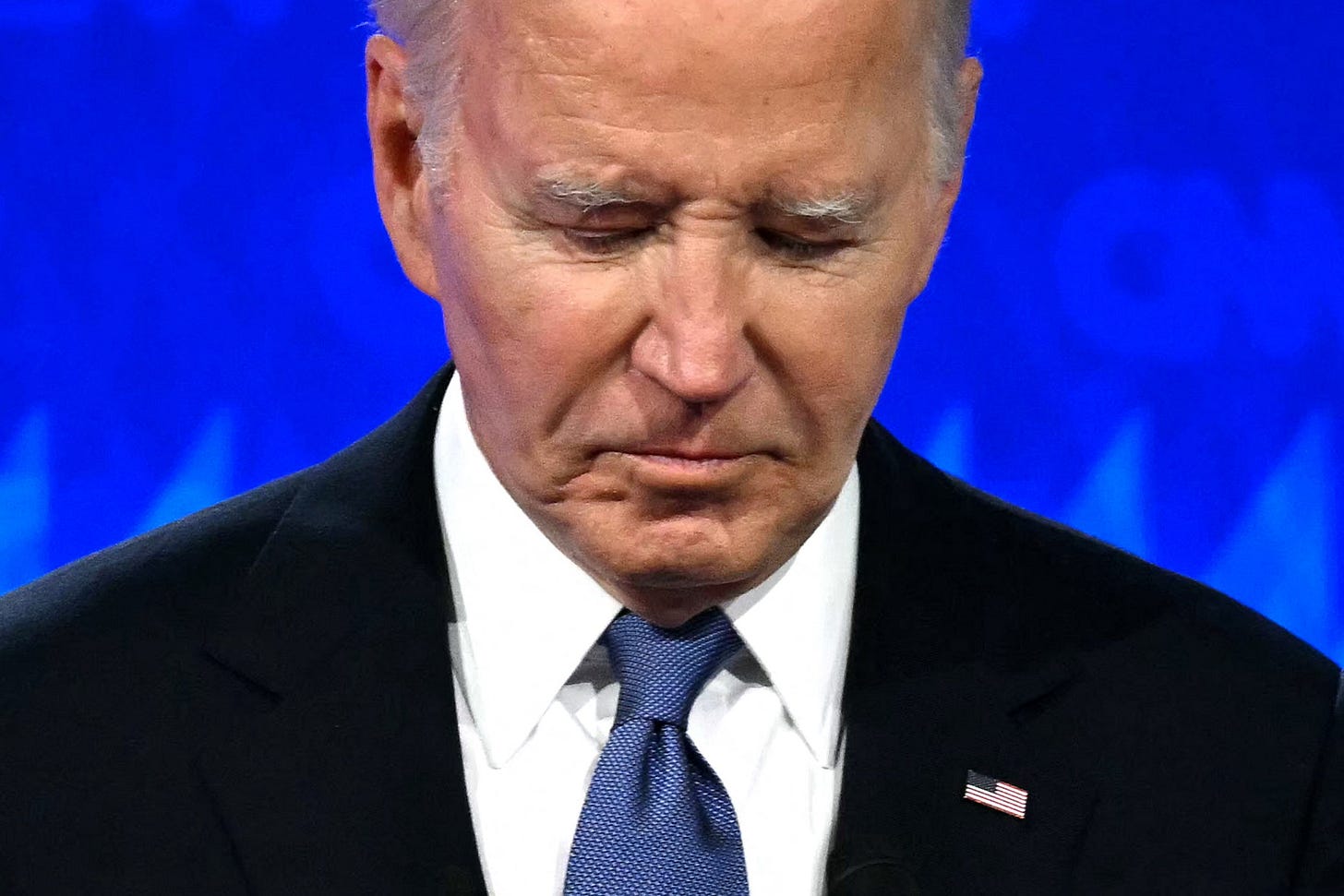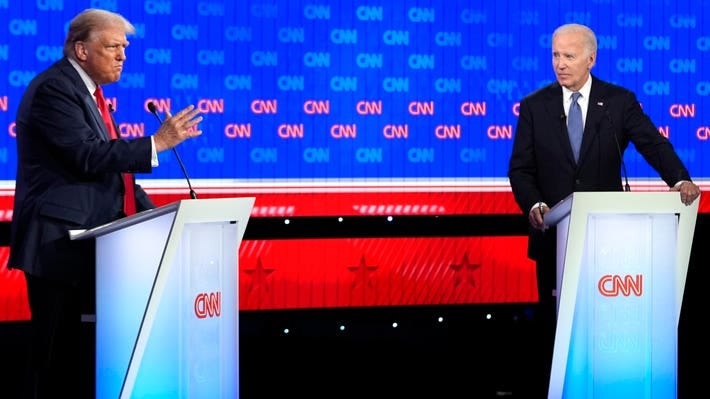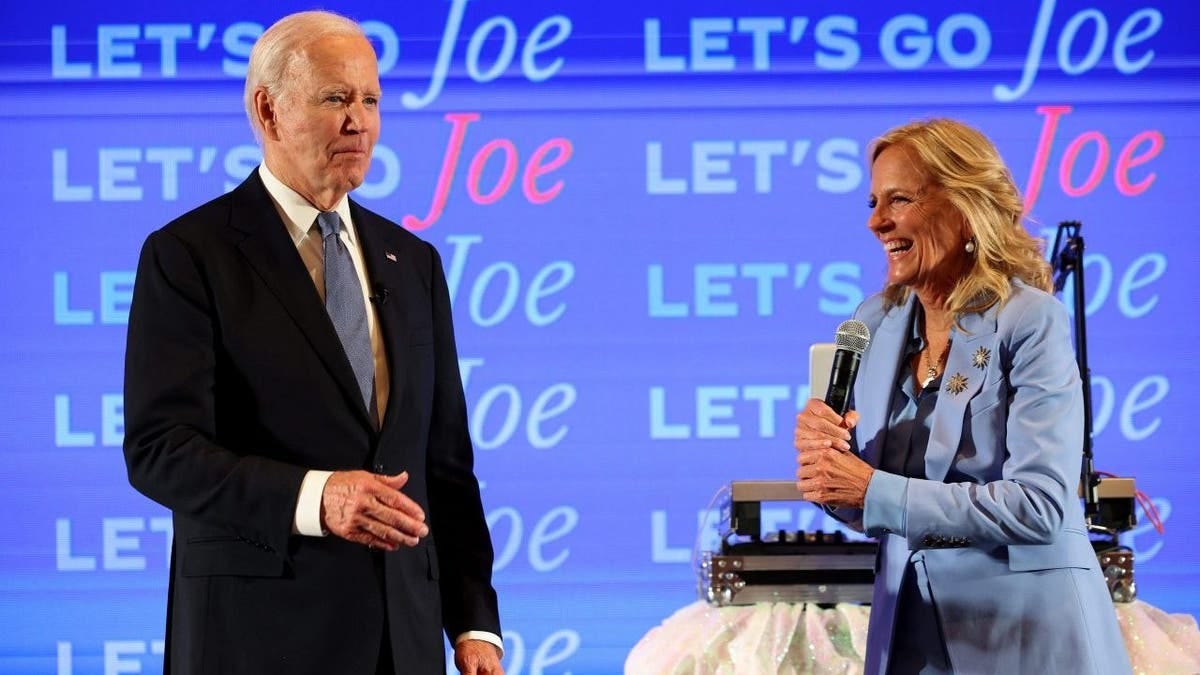The Democrats have a Biden problem
Whatever your politics and your views on the current president, there are some questions that ought to be answered
There is no need for me to add to the avalanche of detailed analysis of Thursday’s presidential debate in Atlanta, Georgia. Anyone who tries to argue that it was less than a major setback for President Biden simply isn’t facing up to reality: the 81-year-old incumbent was hoarse, hesitant and lost his train of thought on several occasions, as well as struggling for words and figures. Yes, Donald Trump pumped out more falsehoods than one could easily count and was suffused with arrogant hyperbole, but that was priced in. His supporters will have loved his swagger and brashness, while detractors will have shaken their heads in renewed despair. The Republican candidate is 78 himself, with a tortured, tangled mental thought process which should cause us all concern, as I addressed in an essay a couple of weeks ago. Nevertheless, in a direct comparison on Thursday, he looked infinitely more vigorous and sure-footed.
In the wake of the debate, after a grotesque performance by the First Lady, Dr Jill Biden, which sounded like nothing so much as a primary school teacher encouraging a struggling child, there have been calls from across the political spectrum for the president to step aside as his party’s nominee in November’s election and allow the Democratic National Convention in Chicago in August to choose a new candidate. This is not an outrageous suggestion: Biden is already the oldest president in United States history, nearly five years older than Ronald Reagan when the latter left the White House after two terms in office (1981-89), and he is asking the electorate to give him another four years as the nation’s chief executive. There were times during Thursday’s debate when it was reasonable to worry about his capacity to discharge his duties for the remaining seven months of his current term. That an editorial in The New York Times, the in-house journal for establishment liberalism, declared against Biden’s candidacy shows the depths of unease.
Of course it is fair to counsel a degree of caution in the short term. Biden’s performance was so bad that many viewers were shocked into seeing in the president an insuperable obstacle to victory, but it is true that television debates rarely make a significant difference to election results. However, this is not a new issue. Polls have shown for months that a majority of voters believe Biden is too old to be re-elected as president, and, more worryingly for the Democratic Party, by a margin of 53/42 regard Biden’s age and cognitive condition as a more important factor than Donald Trump’s felony convictions, other pending criminal charges and attitude towards democratic norms. It would be short-sighted and foolish of the Democrats to pretend this issue does not exist.
There are two interconnected problems. The first is that Biden already has the support of 3,894 delegates to the convention and is therefore the presumptive nominee of his party, and there is no mechanism to strip him of that status against his will. The second issue, then, is that Biden would have to step aside as the Democratic nominee of his own volition, and he shows no sign of being inclined to do this. The commentariat has been ablaze with assessments of potential replacements, from Vice-President Kamala Harris and Governor Gavin Newsom of California to 2016 challenger Hillary Clinton and former first lady Michelle Obama. As matters stand, however, it is nothing more than a parlour game.
There are two sets of questions which I think should be laid out explicitly and ought to be answered, though I suspect they may not be. The first set concerns President Biden’s cognitive abilities and degree of impairment. Biden himself has sought to brush off the embarrassing performance by conceding that he is ageing but emphasising that, unlike Trump, he is honest and truthful. The vice-president is regurgitating the line that Biden is sharp and engaged in private, conveniently when there are no objective witnesses, while Governor Newsom, showing ostentatious loyalty, has insisted that Biden won the debate. This bare-faced denial of reality does reflect well on the White House or the Democratic Party, and insults the electorate.
As a matter of public record and respect for voters whose support Biden is seeking in November, the following questions should be formally and fully answered:
1. What caused the president to lose his train of thought repeatedly and garble his words during the debate?
2. Unless (which seems improbable) this is the first episode of its kind the president had suffered, how many other times has he been similarly confused and unintelligible, and when did it first happen?
3. Assuming the president has sought a medical assessment of these episodes of cognitive impairment, what is the clinical prognosis of Biden’s mental acuity?
4. What legal advice, if any, has been sought about the potential operation of Section 4 of the Twenty-Fifth Amendment to the Constitution, which addresses circumstances in which the president is “unable to discharge the powers and duties of his office”?
The Twenty-Fifth Amendment was adopted in February 1967 and Section 4 has never been invoked. However, its use was discussed after the attempted assassination of Ronald Reagan in March 1981, at the beginning of 1987 amid concerns about President Reagan’s early signs of dementia, after Donald Trumop’s dismissal of FBI director James Comey in May 2017 and during the attack on the US Capitol in January 2021.
As I say, I doubt any of those questions will be answered, but the electorate, if it is being asked to endorse President Biden for another four years, is absolutely entitled to explanations. Assuming, however, that the president remains his party’s nominee for the election in November, then the situation prompts other questions (which, again, I am confident will not be answered).
1. Does President Biden believe he is the most able and qualified person in the Democratic Party to govern the United States for another four years?
2. Does the president think he has the best chance of any potential candidate of defeating Donald Trump in November’s election?
3. If he is not willing to assent to either of those propositions, why is he standing for re-election given evidence of public concern about his age and cognitive ability and his reputationally damaging performance on Thursday?
4. Does President Biden accept that he has suffered any significant level of cognitive decline since his inauguration in 2021 or his departure from office as vice-president in 2017?
5. If he does admit any diminution of his cognitive abilities, yet is determined to seek re-election as president, what contingency plans are in place to address potential further decline, and how, and at what point, would he and/or his advisers, cabinet officers and colleagues reach a decision that he was no longer able to discharge the functions of his office?
These are not loaded partisan questions. I regard Donald Trump as a substantial threat to the democratic system of the United States, a reckless would-be autocrat and a politician of dangerous mental confusion, inconsistency and unpredictability. But I don’t think it is good enough for the Democratic Party to expect voters to overlook any and every fault in President Biden simply on the grounds that he is not Donald Trump. The 2024 presidential election is not a foregone conclusion, but there is at least a risk as things stand that the Democrats lose control of the White House became Biden remains their candidate rather than being able to nominate someone younger and more coherent.
I have not heard anyone credibly argue that Biden will, rather than should, step aside. Of course anything can happen, and the president may still defeat Trump. It is, however, extremely unlikely that his cognitive condition will improve as he passes his 82nd birthday in November, so the Democrats have to face up to the fact that they, and President Biden, are taking an enormous risk not only with the election but potentially with the governance of the United States for the next four years. That risk should oblige them to display a degree of candour and accept the contested nature of the decisions they are making.






Yes, you’re quite right about the distinction. In fact there has been a general conflation of the argument that Biden is not the best candidate for November’s election and the argument that he is not fully up to the job right now. Agree that there is no obvious candidate who is measurably better on most metrics.
Your questions addressed directly to President Biden are a bit pointless since surely the point about cognitive decline is that one doesn't know one is experiencing it? The suggestion by Giles Hawkins that Vice-President Harris is " less popular by several orders of magnitude even amongst Democrats" is untrue. She runs a few points behind Biden in match ups against Trump. The ideal candidate to take over from Biden, if it could be arranged, is Governor Gretchen Whitmer of Michigan. She has been twice elected Governor of a state which is absolutely critical to the Democrats' chances of retaining the White House.